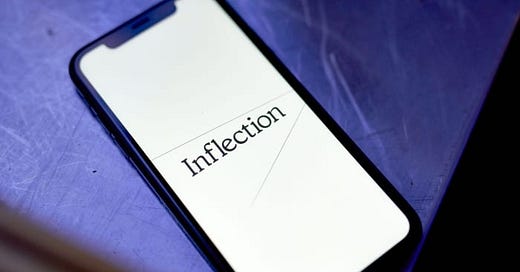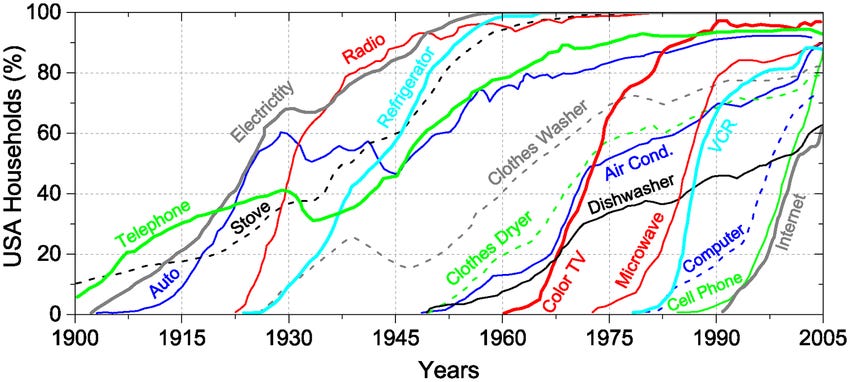some recent questions about American antitrust. let’s begin by looking at the recent Microsoft-Inflection deal. to emphasize the fact that i’m not a lawyer, i’m going to write the details in my ancestral tongue, greentext
> 2022: be “Inflection AI”, startup by Mustafa, Karén, and Reid (2022)
> the product is a personalized ai chatbot named “pi”
> 2022: raise a big bag
> 2023: raise another big bag — $1.3b at $4b valuation — primary investor Microsoft
> 2024: aquihire
Microsoft pays to license the technology
Microsoft pays for Mustafa and Karén to come to Microsoft, where Mustafa will lead "Microsoft AI"
Microsoft pays for some number of technical employees to come to Microsoft. it's unclear how many (Microsoft says “several", Bloomberg says "most", Wikipedia says "almost all")
Reid Hoffman will stay behind at Inflection, which will now become an "AI Studio" (?) (alright)
> tldr: Microsoft doesn’t want the product, and they don’t want all the employees. they take the technical talent. but if you take away the technical talent from a technical company, you end up with a company that might have money to operate but definitely doesn’t have the ability to continue doing what it was doing.
> functionally the deal ends up being a lot like an acquisition … except …
Microsoft escapes a lot of regulatory scrutiny
while getting to pick/choose whatever they want
while leaving the shell behind
if you were working at Inflection and you didn’t get hired by Microsoft, you’re fucked
all your shares are worthless
and now you’re either going to be fired or you’re going to work at a shell of a company
if you’d had been acquired and then fired at least you would have gotten a bag
so actually, the outcomes for everyone except Microsoft are on par worse than a traditional acquisition
> why not just make Microsoft acquire Inflection then .. ? ? a pesky little thing called “American antitrust law”
FTC/DOJ would likely have scrutinized this deal heavily1.
section 7 of the Clayton Act restricts the mergers and acquisitions of organizations that may substantially lessen competition or tend to create a monopoly
lots of words here, the one to focus on is “monopoly”. antitrust is designed to discourage monopoly. why?
because americans distrust large concentrations of power2because antitrust is designed to uphold state power over non-state economic power3because under a monopoly, the consumer is fucked:
there is no leverage over the current provider
and the startup costs of a new provider are higher than what is feasible with the current provider because of economies of scale
monopolies that don’t harm consumers tend to:
operate under strict regulation,
deliver efficiencies so massive that even monopoly pricing feels like a fair bargain,
and, in the long term, become monopolies which harm consumers :)
(for all its benefits, AT&T's monopoly over the U.S. telephone system led to obvious consumer disadvantages: prohibitively high prices for long-distance phone calls, slow innovation in customer conveniences, limited service options.)
there are some markets where monopolies are inherently infeasible
craft beer, bespoke manufacturing, barbershops, restaurants:
markets where:
customers value unique, local offerings
there is a low barrier to entry
but there are also markets that basically demand monopolistic conditions just to operate effectively
> tech is full of ‘natural monopolies’ which the FTC/DOJ don’t know quite what to do with
Google’s dominance isn’t (just) because of anticompetitive practices: it’s also because search quality improves as you collect more data, which creates a feedback loop
and even moreso than other forms of software, AI language models favor giants because only giants can handle the scale of compute costs and data dominance
like, if your software company doesn’t get acquired, it’s probably fine, because software is so cheap. but ai is expensive
it’s so capital intensive to compete against the large companies that there’s no way to get any value back in the event that you don’t succeed unless you get acquired
and not only are these startups capital intensive, they’re asset light … remember, Inflection didn’t actually have assets … they didn’t own any hardware. they were renting the GPUs. there’s nothing tangible to liquidate. they may have raised a lot of money, but how much cash did they actually have? how much of that money was in deals that were worth money?
> TLDR: in capital-intensive markets the market structure standard of antitrust fails.
> there are, of course, other frames: consumer welfare, economic efficiency, populism, worker welfare, innovation, public interest.
> not to get hopelessly sophomoric (Foucaultian) but ultimately the question behind all these questions is “who gets to make decisions on behalf of other people”
if Standard Oil provides kerosene which people use in their lives, and they provide it consistently and stably, is that good for consumers even if they’re a monopoly? (yes)
what about when Standard Oil begins leveraging its scale position to gobble up the entire supply chain using straight-up racketeering and bribery?
what about when Standard Oil inevitably begins exploiting monopoly pricing power over consumers?
what about when those consumers inevitably begin to resent and (partially) misunderstand and attempt to politically destroy the exact company which provides them with that stable consumer good? should they be able to do that?
> eventually, it’s likely that a bunch of leading AI models will get developed in some unified manner, even if that’s a few years down the road.
> but no thoughts on that for now, my dear and faithful readers. i’m gonna all learn about Standard Oil first. so tonight i offer you only my deeply affectionate and compassionate thoughts. and i wish for you too, hours and days filled with calm, joyful, intense focus and movement
Many thanks to James Hill-Khurana and Chris Beiser for their judicious and generous comments. And thanks to YOU for reading!
it’s still not even clear if the Inflection deal actually is safe under existing antitrust law, only that it could skip some process. but UK regulators said OK. and Ms. Khan is almost certainly unemployed.
🦅
i mean, sure? trivially true. but the whole point of “state power” is, allegedly, to protect the constituents of that state. aka consumers. so it feels incorrect to say that antitrust is only about state power over non-state economic power, and not about consumer protection





